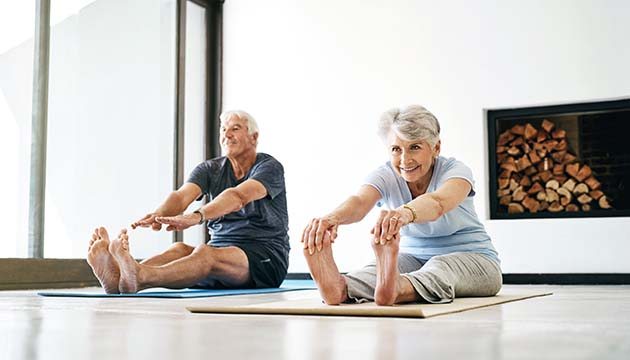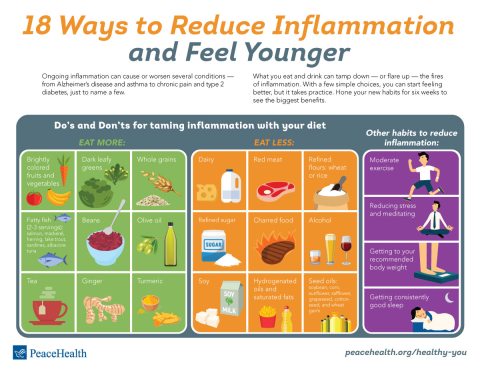How to douse the fires of inflammation

Every bite we take, every move we make, can heal or hurt
Would you like to feel a decade or two younger? Thanks to an anti-inflammation diet, one PeaceHealth Medicare weight loss class participant has lost more than 90 pounds, reducing her body mass index to a healthy 23. Now in her 70s, she says she feels better than in her 50s and 60s. A former cardiac patient, she now requires no cardiac follow-ups, as long as she has no new symptoms.
Inflammation: Bodies on fire within
Inflammation is your body's way of protecting itself from infection, illness or injury. The word does conjure the image of...fire. Additional blood, heat and chemical reactions can create healing, as well as pain to alert us when something is wrong.
“Like fire, inflammation can serve us, or harm us,” says PeaceHealth dietitian and diabetes educator Jendy Newman, RD. “Low-grade inflammation can exist in many places throughout the body with very few symptoms, leading to all sorts of chronic problems.”
Among the conditions caused or made worse by inflammation are:
- Alzheimer’s disease
- Asthma
- Cancer
- Chronic obstructive lung diseases (emphysema and bronchitis)
- Chronic pain
- Type 2 diabetes
- Heart disease
- Inflammatory bowel disease (Crohn’s or ulcerative colitis)
- Stroke
- Diseases where the immune system attacks the body, such as rheumatoid arthritis, lupus, or scleroderma
Your doctor can confirm your inflammation levels with a test for C-reactive protein (hs-CRP).
Good news: fire brigade to the rescue
Like a bucket brigade of old-time firefighters, we have the power to fight our own lasting inflammation, douse the fires, and reverse or improve many of these health issues.
“I wish more people knew the power of whole plant-based foods and the Mediterranean diet to fight disease,” Newman says. “We need a team of all the foods in our fire brigade to keep going. One bucket of water — one simple supplement or limited time of change — won’t help much.
“If there’s even one weak link, it can spoil the whole brigade, allowing inflammation to remain or grow, sometimes in hidden parts of the body” she says. That said, it's not as if you have to be "perfect" when it comes to your diet, but you will feel better when you're consistent about the foods you choose to either include or exclude on a regular basis.
Whole plant-based foods are unprocessed or minimally processed, resembling or still in the form in which they came from the farm, without the added sugars or other chemicals often found in processed foods. Why no added sugar or processed food? Newman explains that high sugar intake increases fats around organs in the core, which causes more inflammation problems in and around those organs.
What about medication?
Nonsteroidal anti-inflammatory drugs (NSAIDs) such as aspirin, ibuprofen and naproxen can be effective in the short term to reduce fever and inflammation and relieve pain.
There can be serious side effects and risks associated with these drugs though, and they don’t address the underlying cause of the inflammation, or work to heal it like lifestyle changes do. Proper dosage and following a doctor’s instructions are very important, even when using them for short-term relief. Other medications can have harmful reactions with NSAIDs as well.
The big four of gut inflammation
In his practice as a gastroenterologist at PeaceHealth St. John Medical Center in Longview, Wash., Anil Kabrawala, MD, has seen profound improvements in gut inflammation when his patients reduce their intake of dairy, refined (as opposed to whole grain) gluten from wheat, high fructose corn syrup and red meat.
“We need to educate our communities to eat more "whole foods" — that is, foods that are as close to their natural form as possible," says Dr. Kabrawala. "I see huge, huge improvements in patients who make these changes in energy, focus and improved gut issues. Most of my patients with IBS (irritable bowel syndrome) significantly improved in days, just from these dietary changes.”
Do’s and Don’ts for taming inflammation with your diet
| Eat more: | Eat less: |
|
|
A “handy” tip
In her classes, Newman teaches students to use a plate no larger than both their flat hands, then fill it like this:
- ¼ non-starchy vegetables such as greens
- ¼ fruit or extra helping of non-starchy vegetables
- ¼, or up to their palm size, of protein (fish or lean white meat or vegetarian)
- ¼ whole grain or minimally processed starchy vegetable

Practice makes perfect, at home or eating out
More good news: Making a few changes — like choosing whole grain breads instead of white bread, or adding a few fruit servings — can start making an immediate difference, though it may take up to six weeks for some people to see a significant change.
“Work one step at a time; it doesn’t have to be perfect from the start,” Newman assures us. “It takes a while to build anti-inflammation skills. It can take a while to learn what dark leafy greens you like and how to prepare them.”
Newman and her colleagues teach these skills in online webinars, cardiac rehabilitation and Preventing T2 (type 2 diabetes) classes.
“Eating out is the hardest thing, for me and most of my patients,” admits Dr. Kabrawala. “I eat mostly soy-free vegan (no animal products) at home though, and that can make a big difference.”
Exercise and weight loss play their parts
Moderate exercise can also produce good anti-inflammatory chemicals in the body.
For best results, the U.S. Department of Health and Human Services recommends for adults:
- At least 150 minutes (30 minutes, five days per week) of moderate intensity, aerobic physical activity per week, or
- 75 minutes of vigorous-intensity, aerobic physical activity spread throughout the week.
- In addition, muscle-strengthening activities (such as weightlifting or using resistance bands) on two or more days per week, in moderate or high-intensity.
- Make sure you consult your provider for safe guidelines to fit your body and current health.
Don’t forget the zzzz’s
Another powerful player in our anti-inflammation bucket brigade is sleep. Getting less than seven to nine hours per night can contribute to inflammation and the diseases it feeds. Taking a few steps to improve sleep can keep this firefighter in your anti-inflammation brigade going strong.
Additional source: The Anti-Inflammatory Lifestyle, University of Wisconsin-Madison






